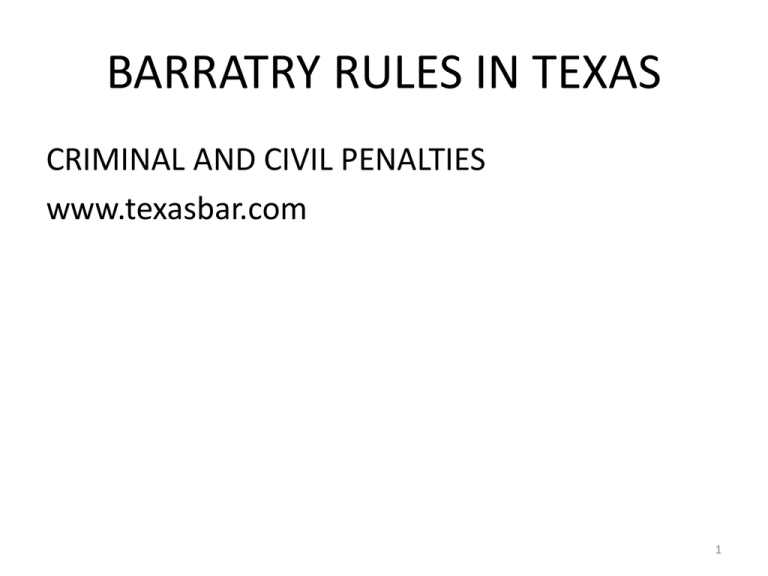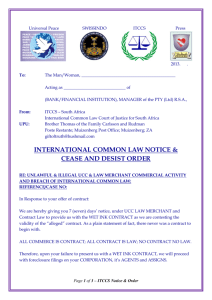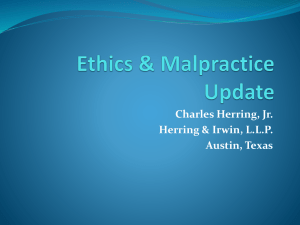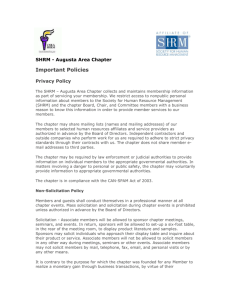BARRATRY RULES IN TEXAS CRIMINAL AND CIVIL PENALTIES www.texasbar.com 1
advertisement

BARRATRY RULES IN TEXAS CRIMINAL AND CIVIL PENALTIES www.texasbar.com 1 SOLICITATION AND BARRATRY FREQUENTLY ASKED QUESTIONS Q: Under the Texas Disciplinary Rules of Professional Conduct, can I be disciplined if I telephone or visit in person with someone that I know has been arrested or involved in a car accident to solicit them as a client? 2 SOLICITATION AND BARRATRY FREQUENTLY ASKED QUESTIONS A: With certain limited exceptions, the answer is yes. Also, it would be a Rule violation for a lawyer to have someone else, including a non-lawyer, solicit clients in this manner for them. 3 Under the Texas Disciplinary Rules of Professional Conduct, can I be disciplined if I send a letter to someone that I know has been arrested or involved in a car accident to solicit them as a client? 4 Generally, no, if you follow Rule 7.05 concerning written solicitations and Rule 7.07 concerning filing requirements of written solicitations. However, also see Rule 8.04(a)(9) which prohibits lawyers from engaging in conduct that constitutes barratry as defined by the law of this state. 5 Q: Under the Texas Disciplinary Rules of Professional Conduct, can I be disciplined if I pay someone not licensed to practice law to solicit clients for me or to refer clients to me? 6 A: With certain very limited exceptions, the answer is yes. Also, Rule 7.03(c) prohibits payments to clients or anyone else in order to solicit employment. Additionally, accepting referrals from certain Lawyer Referral Services is also prohibited. See 7.03(e). 7 Q: Isn’t there also a section in the Penal Code that deals with barratry? A: Yes, see Penal Code section 38.12 Barratry and Solicitation of Professional Employment. 8 Q: What about Penal Code section 38.12(d)(2)(C), which deals with direct-mail solicitation of criminal defendants, being held unconstitutional? A: Many years ago, in Moore v. Morales, 843 F.Supp. 1124 (S.D. Tex. 1994), the district court found Tex. Penal Code section 38.12(d)(2)(C) unconstitutional as it relates to written solicitations of persons who are arrested or issued a summons. The Attorney General did not appeal this portion of the court’s holding. See Moore v. Morales, 63 F3d.358, 360 (5th Cir. 1995). 9 In 2009, the 81st Texas Legislature passed House Bill 148(H.B.148), which amended the barratry statute. The amended statute retained 38.12(d)(2)(C), notwithstanding the prior ruling in Moore, leading to confusion as to whether the provision remained viable. 10 After the 2009 amendments, a lawyer, Villasana, challenged the constitutionality of Tex. Penal Code section 38.12(d)(2)(C). See McKinley v. Abbott, 643 F.3d 403, 404-05 (5th Cir. 2011). The 5th Circuit dismissed the lawyer’s claims as moot rather than directly affirming the district court’s holding that the provision was unconstitutional. 11 During McKinley, a new statute creating civil liability for barratry was signed into law on May 19, with an effective date of September 1, 2011. On August 5, 2011, a Dallas law firm filed suit in the Northern District of Texas once again challenging the constitutionality and enforcement of Tex. Penal Code 38.12(d)(2)(C) as well as part of the new civil remedies provisions. 12 The case is Sullo & Bobbitt, PLLC v. Abbott, Case No. 3:11-cv-01926-D, 2012 WL 2796794 (N.D.Tex.)(dismissing with permission to refile). The Fifth Circuit affirmed, holding that the asserted injuries were conjectural. 2013 WL 3783751 (5th Cir. 2013) 13 Texas lawyers now face the threat of civil enforcement and liability under the government code sections described below. Additional relevant authority on this topic includes: AG Opinion JC-0022 (1999). 14 New civil laws regarding barratry that went into effect on September 1, 2011: Government Code section 82.065 has provisions that deal with the voidability of legal services contracts when barratry is involved. Government Code section 82.0651 creates civil liability with substantial monetary penalties for lawyers who engage in barratry. 15 Based on the uncertainty surrounding the continued viability of Penal Code section 38.12(d)(2)(C), the State Bar of Texas cannot guarantee lawyers that there is no risk with regard to civil or criminal liability for barratry if lawyers send (or continue to send) written solicitation letters to prospective clients. Tex. Gov’t Code section 82.0651 is a new law and it has not been tested. See Senate Bill 1716. 16 Government Code section 82.065 - Civil Liability for Prohibited Barratry: (a) A client may bring an action to void a contract for legal services that was procured as a result of conduct violating the laws of this state or the Texas Disciplinary Rules of Professional Conduct of the State Bar of Texas regarding barratry by attorneys or other persons. 17 Government Code section 82.065 - Civil Liability for Prohibited Barratry: (b) A client who prevails in an action under Subsection (a) shall recover from any person who committed barratry: (1) all fees and expenses paid to that person under the contract; (2) the balance of any fees and expenses paid to any other person under the contract, after deducting fees and expenses awarded based on a quantum meruit theory as provided by Section 82.065(c); (3) actual damages caused by the prohibited conduct; and (4) reasonable and necessary attorney's fees. 18 Government Code section 82.065 - Civil Liability for Prohibited Barratry: (c) A person who was solicited by conduct violating the laws of this state or the Texas Disciplinary Rules of Professional Conduct of the State Bar of Texas regarding barratry by attorneys or other persons, but who did not enter into a contract as a result of that conduct, may file a civil action against any person who committed barratry. 19 (d) A person who prevails in an action under Subsection (c) shall recover from each person who engaged in barratry: (1) a penalty in the amount of $10,000; (2) actual damages caused by the prohibited conduct; and (3) reasonable and necessary attorney's fees. 20 Government Code section 82.065 - Civil Liability for Prohibited Barratry: (e) This section shall be liberally construed and applied to promote its underlying purposes, which are to protect those in need of legal services against unethical, unlawful solicitation and to provide efficient and economical procedures to secure that protection. 21 (f) The provisions of this subchapter are not exclusive. The remedies provided in this subchapter are in addition to any other procedures or remedies provided by any other law, except that a person may not recover damages and penalties under both this subchapter and another law for the same act or practice. 22 Vernon's Texas Statutes and Codes Annotated § 38.12. Barratry and Solicitation of Professional Employment (a) A person commits an offense if, with intent to obtain an economic benefit the person: (1) knowingly institutes a suit or claim that the person has not been authorized to pursue; (2) solicits employment, either in person or by telephone, for himself or for another; (3) pays, gives, or advances or offers to pay, give, or advance to a prospective client money or anything of value to obtain employment as a professional from the prospective client; 23 Vernon's Texas Statutes and Codes Annotated § 38.12. Barratry and Solicitation of Professional Employment (4) pays or gives or offers to pay or give a person money or anything of value to solicit employment; (5) pays or gives or offers to pay or give a family member of a prospective client money or anything of value to solicit employment; or (6) accepts or agrees to accept money or anything of value to solicit employment. 24 Vernon's Texas Statutes and Codes Annotated § 38.12. Barratry and Solicitation of Professional Employment (b) A person commits an offense if the person: (1) knowingly finances the commission of an offense under Subsection (a); (2) invests funds the person knows or believes are intended to further the commission of an offense under Subsection (a); or (3) is a professional who knowingly accepts employment within the scope of the person's license, registration, or certification that results from the solicitation of employment in violation of Subsection (a). 25 (c) It is an exception to prosecution under Subsection (a) or (b) that the person's conduct is authorized by the Texas Disciplinary Rules of Professional Conduct or any rule of court. 26 Vernon's Texas Statutes and Codes Annotated § 38.12. Barratry and Solicitation of Professional Employment (d) A person commits an offense if the person: (1) is an attorney, chiropractor, physician, surgeon, or private investigator licensed to practice in this state or any person licensed, certified, or registered by a health care regulatory agency of this state; and 27 (2) with the intent to obtain professional employment for the person or for another, provides or knowingly permits to be provided to an individual who has not sought the person's employment, legal representation, advice, or care a written communication or a solicitation, including a solicitation in person or by telephone, that: (A) concerns an action for personal injury or wrongful death or otherwise relates to an accident or disaster involving the person to whom the communication or solicitation is provided or a relative of that person and that was provided before the 31st day after the date on which the accident or disaster occurred; 28 (B) concerns a specific matter and relates to legal representation and the person knows or reasonably should know that the person to whom the communication or solicitation is directed is represented by a lawyer in the matter; 29 Vernon's Texas Statutes and Codes Annotated § 38.12(d)(2) cont’d …including a solicitation in person or by telephone, that: (C) concerns an arrest of or issuance of a summons to the person to whom the communication or solicitation is provided or a relative of that person and that was provided before the 31st day after the date on which the arrest or issuance of the summons occurred; 30 Vernon's Texas Statutes and Codes Annotated § 38.12(d)(2) cont’d …including a solicitation in person or by telephone, that: (D) concerns a lawsuit of any kind, including an action for divorce, in which the person to whom the communication or solicitation is provided is a defendant or a relative of that person, unless the lawsuit in which the person is named as a defendant has been on file for more than 31 days before the date on which the communication or solicitation was provided; 31 (E) is provided or permitted to be provided by a person who knows or reasonably should know that the injured person or relative of the injured person has indicated a desire not to be contacted by or receive communications or solicitations concerning employment; (F) involves coercion, duress, fraud, overreaching, harassment, intimidation, or undue influence; or (G) contains a false, fraudulent, misleading, deceptive, or unfair statement or claim. 32 Vernon's Texas Statutes and Codes Annotated § 38.12. (e) For purposes of Subsection (d)(2)(E), a desire not to be contacted is presumed if an accident report reflects that such an indication has been made by an injured person or that person's relative. (f) An offense under Subsection (a) or (b) is a felony of the third degree. (g) Except as provided by Subsection (h), an offense under Subsection (d) is a Class A misdemeanor. (h) An offense under Subsection (d) is a felony of the third degree if it is shown on the trial of the offense that the defendant has previously been convicted under Subsection (d). (i) Final conviction of felony barratry is a serious crime for all purposes and acts, specifically including the State Bar Rules and the Texas Rules of Disciplinary Procedure. 33





